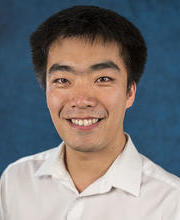Xinyu Chen
Alumnus (Visiting Fellow, Postdoctoral Fellow, Research Associate) and Associate, Harvard-China Project

Researcher Spotlight (first published 2019): During Xinyu CHEN’s Ph.D. studies at Tsinghua University, he spent a year working on projects with China’s National Development and Reform Commission, which was having trouble building a plan for a modern “smart grid” that incorporated more renewable energy sources. “We found out that the problem was not with the power system itself,” says Xinyu. “The problem was actually with the interaction between different kinds of energy systems — like power and heating systems.” In Northern China, for instance, there was great capacity in place for wind power, but incorporating those systems with the region’s prevalent combined heat-and-power units proved a challenge. “My Ph.D. thesis discussed how to better design an integrated power and heating system to better accommodate wind power,” says Xinyu.
His career has continued to focus on finding the unexpected barriers to progress. In a recent paper for the journal Nature Energy, Xinyu — along with co-authors from the Harvard-China Project, Executive Director Chris Nielsen and Faculty Chair Prof. Michael McElroy — looked at electric vehicle charging in China, and found that the relevant emissions gains were dependent on how the vehicles are charged. “If you charge it during the slow charging period in off-peak hours, it is beneficial,” says Xinyu. “But if you mostly use fast-charging stations, it will probably emit more CO2 and other pollutants.” Another core factor: The type of vehicle being charged. “For the sake of reducing air pollution, electrification of buses is actually much more efficient than light-duty vehicles — despite the fact that the number of buses is much lower.”
Xinyu’s passion for science and math can be traced back to his high school years in Inner Mongolia, which culminated in his winning a national physics contest. “So when I entered college, I chose engineering as a focus, because I felt it was related to physics,” he says. He began working with the Harvard-China Project as an exchange student during his doctoral studies, returned as a postdoctoral fellow, and is now a research associate and lecturer. He is currently juggling a number of research projects: exploring how the digitization of China’s energy system could improve understanding of the implications of different energy policy designs; what the introduction of market mechanisms into the power systems would mean in real-world practice; and determining the optimal combination of energy sources to help mitigate the variability of the renewables.
Xinyu is also teaching the “Energy Economy for Developing Countries” course this past fall with Prof. McElroy. Xinyu taught a version of the class last year, he says, which was mainly focused on China. “This year, we extended the scope of the course to cover India and Africa as well,” says Chen. “We think Indian and African energy demand will continue to grow — probably at a double-digit pace — for several decades to come.” The lessons from China’s energy experience, he notes, can span borders. (Written by Dan Morrell)
